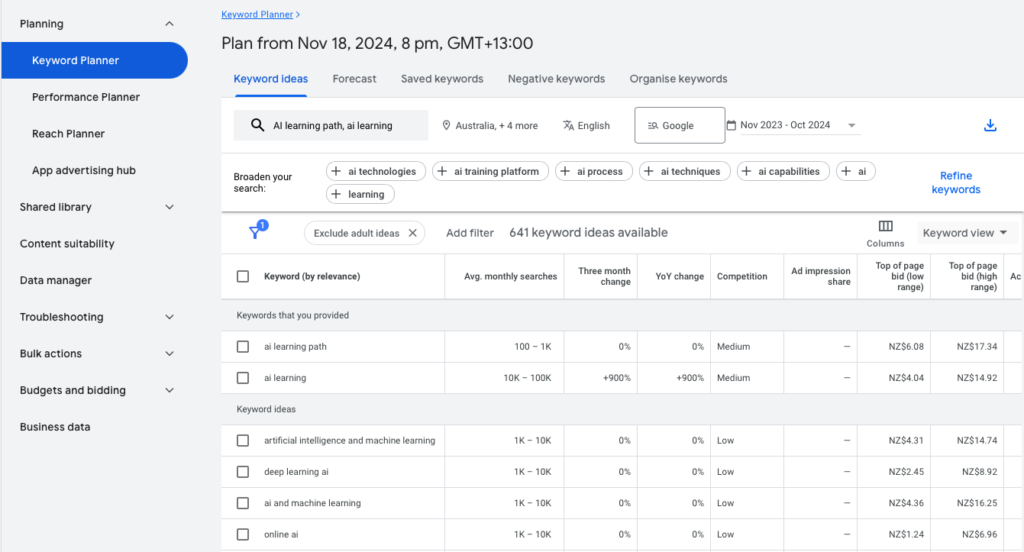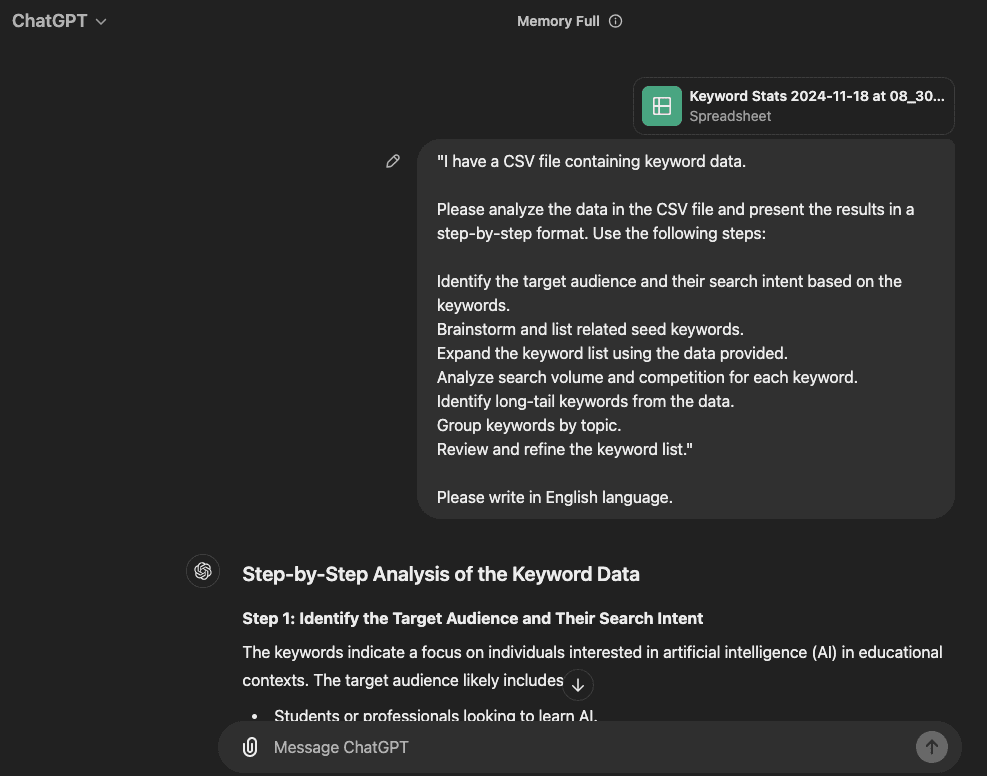Disclosure: This article was created with the assistance of AI technology and is not sponsored.
Are you struggling to master keyword research for your SEO strategy? You’re not alone. As someone recently conducting extensive keyword research for an AI learning project, I’ll show you exactly how to use Google Keyword Planner and other free keyword research tools to uncover valuable SEO opportunities.
The following keyword research step-by-step guide is based on the blog post “Master Keyword Research: Step-by-Step Guide for SEO Success” at vinh.nz
Why Keyword Research Matters
Before looking into the keyword planner tools, let’s understand why proper keyword research is crucial. It’s not just about finding popular search terms – it’s about understanding your audience’s intent and creating content that meets their needs.
Getting Started: The Practical Reality
Before diving into the analysis, let me share some practical tips about accessing and preparing your keyword data.
Setting Up Google Keyword Planner
First things first – you’ll need a Gmail account to access Google Keyword Planner. While it’s part of the Google Ads platform, don’t worry – you can use the keyword research tool without running ads.

Data Preparation: Then vs Now
The Traditional Approach: Before AI tools became available, my keyword research process was quite time-consuming:
- Download raw data from Google Keyword Planner
- Import into Excel or Google Sheets
- Spend days analyzing and organizing the data manually
- Create pivot tables and charts to visualize trends
- Make multiple spreadsheets for different aspects of analysis
The AI-Enhanced Approach: Even with AI tools like ChatGPT and Claude, some preliminary data cleaning is crucial:
- Export data from Google Keyword Planner as usual
- Use Excel or Google Sheets for initial data cleaning:
- Remove keywords with very low monthly searches (they often aren’t worth targeting)
- Filter out irrelevant terms
- Trim the dataset to a manageable size (especially important for free AI tool versions)
- Save the cleaned data as a CSV file for AI analysis
Pro Tip: When using free versions of AI tools like ChatGPT or Claude, large datasets can be challenging to process. I recommend focusing on keywords with significant search volume (1,000+ monthly searches) to keep your file size manageable.
I typed a prompt into ChatGPT (you see that I used a free version, it doesn’t cost me a cent) to analyse the following steps in the next section.

This is the prompt I use and so do you
Prompt:
I have a CSV file containing keyword data.
Please analyze the data in the CSV file and present the results in a step-by-step format. Use the following steps:
Identify the target audience and their search intent based on the kevwords.
Brainstorm and list related seed keywords,
Expand the keyword list using the data provided.
Analyze search volume and competition for each keyword.
Identify long-tail kevwords from the data.
Group keywords by topic.
Review and refine the kevword list
Step-by-Step Keyword Research Process
Without AI, I would do these steps manually, which takes ages. However, for this analysis, I pretend that AI doesn’t exist.
Identify Your Target Audience and Search Intent
Let me show you how this works with a real example. When I researched keywords for an AI learning platform, I used keyword analysis tools to identify three distinct audience segments:
- Students beginning their AI journey
- Professionals transitioning to AI careers
- Educators integrating AI into the curriculum
Pro Tip: Use the Google Keyword Planner to understand what people search for and why they’re searching.
Generate Seed Keywords
Start with basic terms related to your topic. For my AI learning research, I began with:
- AI education
- Machine learning basics
- Online AI courses
Expand these seed keywords into a comprehensive list using free keyword research tools.
Expand Your Keyword List
Here’s where keyword search tools really shine. For example, Google Keyword Planner revealed these variations for AI learning:
- “AI learning for beginners“, (I will choose this keyword to write my next blog)
- “How to use AI.”
- “AI education platforms”
This same approach works for any topic – let the tools suggest variations and combinations.
Analyze Search Volume and Competition
Use SEO keyword analysis tools to evaluate each keyword’s potential. Look for:
- Monthly search volume
- Competition level
- Keyword difficulty
- Search trends
Case Study Insight: In my AI learning research, I discovered that specific terms like “AI learning for beginners” had lower competition but a steady search volume, making them perfect targets.
Discover Long-Tail Keywords
Long-tail keyword research is crucial for SEO success. These longer, more specific phrases often have:
- Lower competition
- Higher conversion rates
- More specific user intent
For example, I found opportunities in AI learning with phrases like “how to start learning artificial intelligence for beginners” – less competition but highly targeted traffic.
Group Keywords by Topic
Use keyword research tools to organize your findings into themed clusters. In my AI learning research, I grouped keywords into:
- Learning Resources
- Tools and Platforms
- Career Development
This organization helps plan content clusters and site structure.
Refine Your Keyword Strategy
Final steps for keyword optimization:
- Prioritize keywords based on the following:
- Search volume
- Competition
- Relevance to your goals
- Remove redundant terms
- Focus on opportunities with the best ROI
Tools for Success
To replicate this process, you’ll need:
- Google Keyword Planner (free keyword research tool)
- SEO keyword research tools
- Keyword analysis tools (you can use ChatGPT, Claude AI)
- Competitor keyword research tools
Practical Implementation Tips
- Start Small: Begin with free keyword research tools to understand the basics
- Track Progress: Monitor keyword rankings regularly
- Update Regularly: Keyword research isn’t a one-time task
- Consider User Intent: Always prioritize search intent over search volume
Conclusion
Successful keyword research combines the proper tools with strategic thinking. As demonstrated through the AI learning case study, methodical keyword analysis reveals opportunities you might otherwise miss.
Remember: The best keyword research tool is the one you’ll actually use consistently. Start with Google Keyword Planner, and expand your toolkit as your needs grow.
And you see, AI boosts your productivity, and you can save a ton of time for your loved one.
Ready to start your keyword research journey? Begin with a free keyword search tool and follow this process. Your SEO success story begins here.
Have you used these keyword research techniques for your projects? Share your experiences in the comments below!


